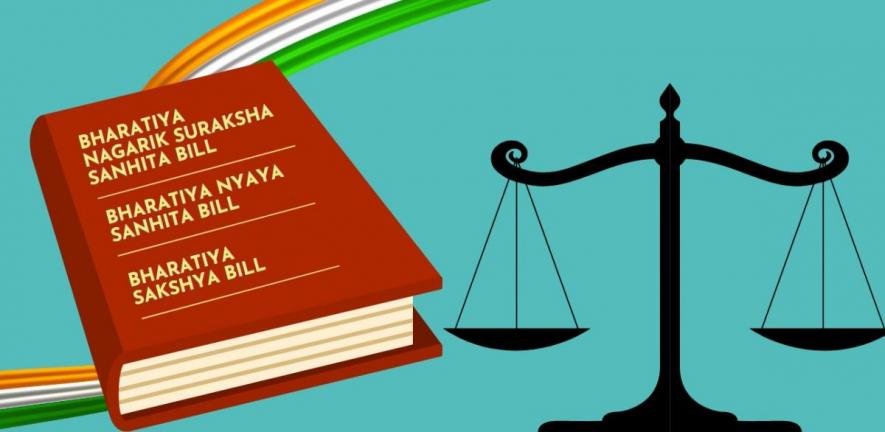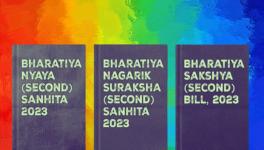What Does ‘Indianisation’ and ‘Reform’ Mean in the Context of 3 New Criminal Law Bills?

Image credit: The Leaflet
Just days before India’s 77th Independence Day, on August 11 this year, the government introduced three new Bills in the Parliament replacing three existing criminal laws.
Should these Bills be ratified, then the Bharatiya Nyaya Sanhita, 2023 will replace the Indian Penal Code, 1860.
Similarly, the Bharatiya Nagarik Suraksha Sanhita, 2023 will replace the Code of Criminal Procedure, 1973, and the Bharatiya Sakshya Bill, 2023 will replace the Indian Evidence Act of 1872.
The purported reason for the introduction of these Bills is to “reform” the criminal justice system in India and to “Indianise” it.
The Union home minister Amit Shah, while introducing these Bills, stressed their intent to bring about justice rather than having mere punitive measures in place.
Upon careful examination of the aforementioned Bills, it has become apparent that they primarily entail minor modifications rather than a comprehensive overhaul of the existing criminal justice system.
One striking question that looms over the minds of many is the need to reform the existing Indian Penal Code (IPC), which has already undergone numerous amendments to better suit the dynamic nature of Indian society.
If the government thought there was a pressing need to introduce three new Bills to transform the criminal justice system, surely they must have addressed or included social causes that activists and social reformers have been trying to bring to the forefront for decades in a quest to ‘Indianise’ the laws.
Why else would an existing law simply not continue to exist with its timely amendments if it adequately met the requirements of bringing ‘justice’ to citizens?
What is conspicuously present, however, is the branding of the ‘Bharatiya Janata Party (BJP)’.
This prompts two significant queries: Is this sweeping and potentially disruptive change truly necessary? Furthermore, what impact will this imposition have on an already overburdened criminal justice system?
Amit Shah, who introduced the Bills in the Parliament, rationalises these changes to establish “Bharatiya aatma”, a concept of ‘Indianising’ ‘British’ laws.
‘British’ laws were conceptualised and made applicable to Indians owing to the social landscape in the country.
For example, caste discrimination was not a predominant issue in England, but the framers of the IPC took into account the social problems of the Indian masses and sought to criminalise discriminatory acts against them.
Explanation 4 to Section 499 in the original text of the IPC states that any imputation which lowers a person’s character due to their caste, among other grounds, also amounts to defamation.
Interestingly, England still does not have a comprehensive criminal code, with the majority of the offences remaining uncodified.
In essence, the shortcomings in England’s legal system spawned the codification of India’s criminal law which is a testament to the fact that imperial powers were able to achieve on colonial land what they were unable to achieve on home soil.
‘Indianisation’ of law
But what exactly does ‘Indianisation’ of British laws signify?
The government appears inclined to enact laws that embody the essence of being ‘Indian’, necessitating a journey back in time to the 2nd century BCE when the mythical figure of Manu penned the Manusmriti or even further, to the Vedic period from c. 1500 to c. 500 BCE when the Vedas were formulated.
Why delve so far into history? Because everything subsequent to those periods— be it Sharia-based law with roots in Arabia or the common law system stemming from the Magna Carta— falls outside the realm of ‘Hindu Law’.
Having clarified the notion of “Indianising” colonial laws, let us delve into the essence of these laws.
Note: This is not an assessment of their morality or their discriminatory nature as the social norms and values of ancient societies were vastly different from those of today, but this is rather an exploration of their relevance in a 21st century independent India.
The Manusmriti prescribes an unequal system of justice that aligns with the concept of “Hindu rashtra”, given the instances that are already emerging.
The text is riddled with shlokas exemplifying the same, where the killing of a Brahmin is depicted as the gravest sin of them all.
Excerpts from Chapter 11 of the Manusmriti:
- One fourth (of the penance) for the murder of a Brahmin is prescribed (as expiation) for (intentionally) killing a Kshatriya, one-eighth for killing a Vaisya; know that it is one-sixteenth for killing a virtuous Shudra.
- But he who, intending to hurt a Brahmin, has threatened (him with a stick and the like) shall remain in hell for a hundred years; he who (actually) struck him, during one thousand years.
Excerpts from Chapter 8 of the Manusmriti:
- A once-born man (a Shudra), who insults a twice-born man with gross invective, shall have his tongue cut out; for he is of low origin.
- If he mentions the names and castes (jati) of the (twice-born) with contempt, an iron nail, ten fingers long, shall be thrust red-hot into his mouth.
- If he arrogantly teaches Brahmins their duty, the king shall cause hot oil to be poured into his mouth and into his ears.
In 2022, a judge of the Delhi High Court stated, “I really think we are a blessed lot of women in India and the reason for that is our scriptures have always given a very respectable position for women and as Manusmriti itself says that if you don’t respect and honour women, all the pooja paat that you may do has no meaning.”
The judge went on to say, “So I think our ancestors and Vedic scriptures knew very well how to respect women.”
This implies that our ancestors knew how to respect women or any other individual who was not categorised as a “twice-born man”.
However, ancient scriptures tell a different story.
Excerpts from Chapter 5 of Manusmriti:
- Him, to whom her father may give her, or her brother with the father’s permission, she shall obey as long as he lives, and when he is dead, she must not insult (his memory).
- Though destitute of virtue, or seeking pleasure (elsewhere), or devoid of good qualities, (yet) a husband must be constantly worshipped as a god by a faithful wife.
- By violating her duty towards her husband, a wife is disgraced in this world, (after death) she enters the womb of a jackal, and is tormented by diseases (the punishment of) her sin.
- Having thus, at the funeral, given the sacred fires to his wife who dies before him, he may marry again, and again kindle (the fires).
When religion is woven into law, lines blur. Thus, when Amit Shah proposes ‘Indianising’ colonial laws, it initiates potential divisions based on sex, caste and religion.
The laws of Manu stand to shape the Hindu rashtra. These laws endorse and solidify birth-based inequalities in social, economic, gender and religious domains— inequalities that are inescapable.
Legal ‘reform’
Having explored the concept of ‘Indianising’ colonial laws and its implications, let us turn to their supposed reformatory nature.
In his parliamentary speech, Amit Shah suggested that the current placement of the chapters in the new Bill and approach of the criminal justice system are inherently flawed.
To uplift marginalised groups like women and children, Chapter 5 containing offences against them have taken precedence over offences against the State, which is in contrast to the existing Indian Penal Code of 1860.
When the term ‘reform’ was invoked, optimistic citizens of the nation envisioned a review and modification of specific laws, such as Section 498A (woman subjected to cruelty) of the IPC, which is susceptible to extensive misuse, or enacting new legislation and amendments to criminalise marital rape.
The hope was that these amendments would lead to a more balanced and reasonable legal framework. Regrettably, reality has fallen short of these expectations.
In this context, reformation has come to symbolise not the sincere intention to refine existing laws for greater fairness, but rather the practice of repackaging them under the brand name of the current regime.
Furthermore, as part of an endeavour to shed our British colonial legacy, tall claims have been made that strict colonial-era laws, including sedition, have been abolished.
If this is the case, what about Section 150 of the Bharatiya Nyaya Sanhita Bill, 2023? While it removes the term ‘sedition’’, the import remains the same, if not more severe. Section 150 criminalises “acts endangering sovereignty, unity, and integrity of India.”
Although the phrase “disaffection towards the government established by law in India” has been erased from the old Section 124A (sedition) of the IPC, the new Section 150 is more specific.
Section 150 of the new Bill targets secessionism, separatism and armed rebellion without explicitly using words like “contempt” or “hatred” against the government of India, as Section 124A of the existing Code does.
It leaves room for interpretation by omitting the incitement to violence test and disconnecting the act from public order. The proposed Section 150 tightens the sedition statute under a new name. This seems to be an effort to broaden sedition legislation without the safeguards established by courts.
Gandhi famously described Section 124A as the “prince among the political sections of the Indian Penal Code designed to suppress the liberty of the citizen”.
The new Bill also does away with Section 377 (unnatural offences) of the IPC which earlier criminalised homosexuality and was partially struck down by the Supreme Court in Navtej Singh Johar versus Union of India.
Granted, Section 377 was a reflection of the British colonial mindset, but the new Bill provides no statutory protection to male victims of non-consensual activities.
Another issue that does not see light of the day is marital rape and its criminalisation.
The committee of the Convention on the Elimination of All Forms of Discrimination Against Women (CEDAW) has time and again recommended to its State parties, including India, to criminalise sexual activities done without free consent.
Advocate Vrinda Grover, among many other activists, rightly pointed out that in incidents of marital rape, “it is the consent of a woman which matters and not her relationship with the perpetrator.”
Still, the government has been unable to dispel the notion that it is more convenient to let a victim of marital rape suffer injustice than to criminalise the act for fear of women potentially abusing the provision.
It undoubtedly contradicts the purpose of elevating the importance of crimes against women and children under Chapter 5, proving to be rather otiose.
The Bharati Nyaya Sanhita Bill also introduces a new offence of “terrorist act”, absent in the IPC due to the dedicated Unlawful Activities Prevention Act, 1967 (UAPA).
However, the new Bill’s definition of “terrorist act” is narrower, indicating its commission when India’s integrity and sovereignty are under threat.
Section 111 of the Bill expansively widens its ambit, encompassing any action deemed to “disturb public order” as a terrorist act, especially if it leads to “damage or destruction of property, disruption of essential community supplies or services, destruction of government or public facilities, public spaces or private properties.”
In his book, A Prisoner’s Scrap-Book, penned during his imprisonment during the emergency of 1975–77, Lal Krishna Advani, the patriarch of the BJP, made a profound observation:
“A government that has to rely on the Criminal Law Amendment Act and similar laws that suppresses the press and literature, that bans hundreds of organisations, that keeps people in prison without trial and that does so many things that are happening in India today, is a government that has ceased to have even a shadow of justification for its existence.
“Judging the British government by its onslaught on civil liberties, its reliance on lawless laws, its suppression of press freedom, its outlawing of organisations and its incarceration of people without trial, Nehru declared it as bereft of ‘even a shadow of justification for its existence’.
“Nothing that the British government did in 1936 in the matter of civil liberties can match the crimes committed against democracy by the present government.”
Is it the oppressed who eventually become the oppressors? Is that how the story unfolds?
If the BJP government aims to make more indigenous laws come to fruition, is the Manusmriti a yardstick to measure what a more ‘Indian’ law will be?
Change, in its essence, is beneficial and essential. Yet, the question that remains is whether this is indeed a substantial transformation or a mere repackaging of pre-existing laws?
Aakritee Raj, a passionate law researcher at the Punjab and Haryana High Court, thrives in the world of legal intricacies. Beyond the courtroom, she is a renaissance soul who shuns social media, seeks solace in the timeless melodies of 17th-century music, and finds joy in the company of birds, dragonflies and dogs. When not navigating the pressures of the legal profession, you will often find her climbing mountains.
Nikita D’Lima is a fourth-year law student at NMIMS Navi Mumbai and an editorial intern at The Leaflet. She enjoys learning new languages, visiting comedy clubs and cat memes. She calls herself a Michelin-star chef.
The views are personal.
Get the latest reports & analysis with people's perspective on Protests, movements & deep analytical videos, discussions of the current affairs in your Telegram app. Subscribe to NewsClick's Telegram channel & get Real-Time updates on stories, as they get published on our website.
























